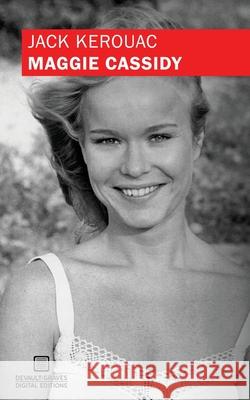Maggie Cassidy (Original Manuscript) » książka
Maggie Cassidy (Original Manuscript)
ISBN-13: 9781942531036 / Angielski / Miękka / 2015 / 284 str.
In 1959 Avon Books published Jack Kerouac s tender look back at his high school years in Lowell, Massachusetts, Maggie Cassidy. One particular passage in the book, written in the form of a letter, contained certain thermo-nuclear profanities that weren t widely accepted in literature, even Beat literature, of that time period. As soon as Maggie Cassidy hit the shelves it upset bookstore owners and book distributors enough that the book was pulled, the passages rewritten, and a new, more politely correct version was issued and republished over the decades to come. The original manuscript has not been republished until Devault-Graves learned of the original version that Kerouac is said to have fought for before the decision was made to excise and rewrite those passages. Devault-Graves now proudly restores the original novel, complete and uncensored. Book description: In Jack Kerouac s teenage years his friends gave him a nickname that was prescient and stuck with him throughout his life--Memory Babe. Kerouac was able to conjure up scenes from his childhood and adolescence that astounded his friends with their precision and detail. This talent was to serve him well as a novelist, enabling him to recall long segments of conversation that he could instantly pound out on his typewriter. Maggie Cassidy is one of Kerouac s most nostalgic recollections of his past, focusing on his first true love when he was a high school senior and a local star athlete. Filled with the sweet innocence of youth and the daily heartbreak of quarrels and unfulfilled sexual yearnings, Kerouac employs his stylishly Beat observations toward the bygone era of pre-World War II Lowell, Massachusetts, when he was torn between the companionship of his gang of buddies and the sirens call of the opposite sex. In addition to his romance with the title character, Kerouac is especially evocative in reproducing the slangy teen-speak of the late 1930s and in detailing how he went from a precocious local boy in Lowell to an exclusive New York prep school where he was to later meet the brilliant young men who would begin the Beat Movement. "
In 1959 Avon Books published Jack Kerouac’s tender look back at his high school years in Lowell, Massachusetts, Maggie Cassidy. One particular passage in the book, written in the form of a letter, contained certain thermo-nuclear profanities that weren’t widely accepted in literature, even Beat literature, of that time period. As soon as Maggie Cassidy hit the shelves it upset bookstore owners and book distributors enough that the book was pulled, the passages rewritten, and a new, more politely correct version was issued and republished over the decades to come. The original manuscript has not been republished until Devault-Graves learned of the original version that Kerouac is said to have fought for before the decision was made to excise and rewrite those passages. Devault-Graves now proudly restores the original novel, complete and uncensored.Book description: In Jack Kerouac’s teenage years his friends gave him a nickname that was prescient and stuck with him throughout his life--Memory Babe. Kerouac was able to conjure up scenes from his childhood and adolescence that astounded his friends with their precision and detail. This talent was to serve him well as a novelist, enabling him to recall long segments of conversation that he could instantly pound out on his typewriter. Maggie Cassidy is one of Kerouac’s most nostalgic recollections of his past, focusing on his first true love when he was a high school senior and a local star athlete. Filled with the sweet innocence of youth and the daily heartbreak of quarrels and unfulfilled sexual yearnings, Kerouac employs his stylishly Beat observations toward the bygone era of pre-World War II Lowell, Massachusetts, when he was torn between the companionship of his gang of buddies and the sirens’ call of the opposite sex. In addition to his romance with the title character, Kerouac is especially evocative in reproducing the slangy teen-speak of the late 1930s and in detailing how he went from a precocious local boy in Lowell to an exclusive New York prep school where he was to later meet the brilliant young men who would begin the Beat Movement.











